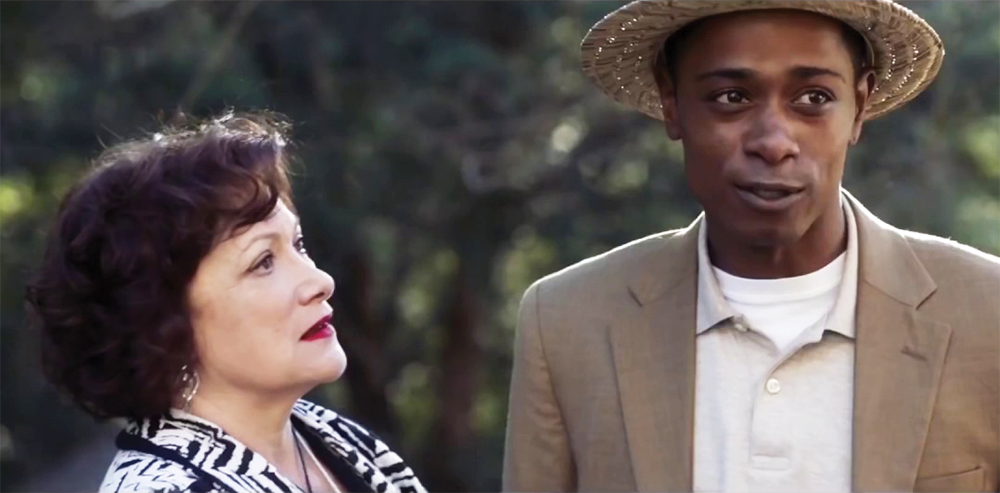
★★★★★
In his directorial debut, Jordan Peele, one of the comedic minds behind Comedy Central’s acclaimed “Key & Peele,” shocks audiences with the racially charged horror film “Get Out.” Peele, who also wrote the script, incorporates some of his dark humor into the production, which premiered at the Sundance Film Festival. The terrifying concept of “Get Out” transcends horror movie archetypes, amplifying present concerns of being black in the United States and pointing to humanity as the monster.
“Get Out” successfully takes risks, notably swapping horror films’ predictable young white female victim for the young black man. The film stars London-born actor Daniel Kaluuya alongside the familiar faces of Allison Williams, Milton “Lil Rel” Howery, Catherine Keener and Bradley Whitford.
The film opens with the romance between Chris, a black photographer played by Kaluuya, and his white girlfriend, Rose, portrayed by Williams. Rose invites Chris to spend the weekend with her family in her “whitetopian” hometown suburb. As hesitant as Chris is, he agrees, despite reservations that Rose’s family will reject their relationship.
“Do they know that I’m black?” Chris asks. They do not, but “my dad would have voted for Obama a third time if he could have,” Rose assures Chris.
Upon meeting Rose’s neurosurgeon father (Whitford) and psychiatrist mother (Keener), Chris is immediately suspect of their demeanor, almost as if they are trying too hard. Chris is uneasy with what appears to be their unfamiliarity with black people, despite the presence of Walter (Marcus Henderson) and Georgina (Betty Gabriel), the two black household employees.
Rose’s family is coincidentally throwing their annual party the same weekend they meet Chris, who becomes the object and spectacle of the white attendees gathering. From there, a series of disturbing events occur, defining the film.
Peele has proven himself a dynamic entertainer and artist with “Get Out,” demonstrating his knowledge of thrilling horror and his sharp skill in incorporating it with an overarching cultural crisis. Those who have seen “Key & Peele” will be able to detect some of his inspiration from sketches such as “Continental Breakfast” and “White Zombies,” positioning Peele as a master at incorporating social satire into the horror genre.
“Get Out” is neither predictable nor corny, as many horror movies can be, and employs smart and sharp satire to explore racial tensions in America. The film’s direct allegory to slavery serves to provide a horrifying context.
Tension and paranoia swell, despite Chris’s attempts to brush off the racist remarks and behaviors of Rose’s family and their friends. He calls his friend and house sitter for the weekend, Rod Williams, played by Howery, who serves as a comedic voice of reason in numerous occasions, helping Chris confirm that he is not crazy and thatthis is really happening.
Through Chris’s lens, the audience sees a community of people who want to own him. The film examines everyday racism and takes it to extreme heights. The partygoers make multiple unnerving remarks, such as the advantages of Chris’s “genetic makeup.”
In a less dramatic context, these comments could easily serve as lines in a “Key & Peele” sketch, but the sinister ambiguities make Chris, as well as the audience, suspect what actually motivates the white partygoers’ fascination. Peele is trying to make audiences uncomfortable; the film, a hybrid of horror and satire, succeeds in making audiences think. However, “Get Out” is not all mind games — the violence and gore is plenty, and it is tastefully executed as satisfying catharsis.
Viewers hesitant to see “Get Out” should know it is not in the least a predictable, formulaic film. It is unimaginably terrifying, with every twist and turn uncertain. What makes this film so audacious and relevant is the replacement of the more foreseeable horror film victims with the young black man, highly infrequent in mainstream film and television. Beyond racial satire, the film’s twists will have audiences both reeling with fright and cheering with excitement throughout the second act. Incredibly disturbing and provocative, “Get Out” is a groundbreaking film everyone should see.



















